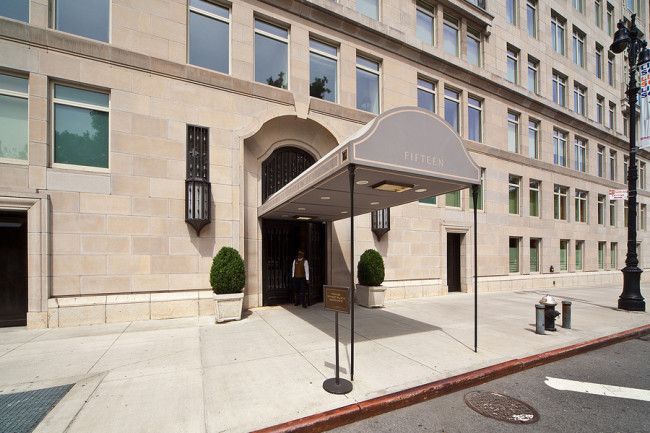How I got a buyout from my Bushwick apartment—and finally bought a place of my own
A rent-stabilized apartment can be a blessing and a curse, a refuge and a trap. The guarantee of a lease renewal and below-market rent can make a landlord reluctant to make repairs, and make a tenant reluctant to leave what otherwise might seem like an unpleasant living situation. A real estate agent once described the predicament as a "golden noose," although "golden handcuffs" is the more common parlance.
For rent-regulated tenants in a tight spot, and especially those in neighborhoods that brokers and real estate publications have deemed "up and coming," there is a way out. Under the current system that makes vacancies opportunities for landlords to deregulate apartments, some are willing to pay their rent-regulated tenants cold, hard cash to leave. Buyouts don't always make sense—sometimes what building owners offer desperate and uninformed tenants is only enough for a couple of months of market rent—but when they do, they can be a tenant's ticket from renting forever to owning their own piece of New York City.
We spoke to one New Yorker for whom the latter has been the case. A renter in Bushwick for just shy of a decade, it can't have hurt that she was a housing lawyer by the time she started negotiating a buyout. Ultimately, she and her landlord agreed on terms worth $146,000, and she was able to put a down payment on a studio co-op in Ditmas Park and still have some money left over. And perhaps best of all, her combined housing expenses are now less than what she was paying in rent.
Here is her story, as told to Brick editor Nathan Tempey, edited for structure and clarity, and presented anonymously because our source signed a nondisclosure agreement with her landlord.
[This story was originally published in September 2017. We are presenting it again as part of our end-of-year Best of Brick Week.]
Coming to Bushwick
I moved to Bushwick in January 2007. I was in law school at the time.
Unlike a lot of Bushwick apartments, which are railroads, this apartment had a regular square-shaped living room, and two square-shaped proper bedrooms.
It was in good shape. The floors had just been redone. It was $1,212 a month. At the time it was market rate for the neighborhood.
We really liked the landlord, and he was going to let us bring my roommate’s cat there. He was this crazy old Israeli guy who loved pets, and when we asked if we could bring a pet he was like, “Can you bring a pet?! I love pets and pet people!”
I was living with my law school friend. We had to move out of our Greenpoint apartment because it was infested with bedbugs, so we were looking for an apartment real quick, and with very few belongings at that point.
My roommate found it, and I believe that he found it on Craigslist. He was a person who just lived on air and was extremely thrifty and had known people in New York for a long time, and knew what he was doing. So I think he searched no-fee apartments and found one.
A change in ownership
The original landlord had the place almost up until the end. He died of lung cancer. He was a fastidious landlord. He followed every rule, and every regulation. I’ve never encountered a landlord as rule-following as this landlord was.
So when I got my rent registration history to see if he had vouched for improvements, he had done all of his homework, and I could say that everything that he said he had done to make the apartment better he had done. So the $1,200 that we moved in with was probably the exact legal, correct rent. And he stayed until he died of lung cancer in 2013 or so.
And then the property passed to his brother, who lived in Florida and didn't want to manage it hands-on. So he got a management company who probably said, "We’re going to manage it, but we’re going to try to find a buyer, or we’re going to try and find some money to buy it." I think the landlord’s brother knew when he got the management company he was going to be able to offload it to somebody pretty soon.
The property both improved and deteriorated under the management company. It improved because the original landlord had all these cats that he kept in the basement, so the apartment building smelled like cat piss all the time. Which we felt was okay, I guess, because he was a nice guy. So when he died, we finally got rid of that smell, which was nice, but they stopped cleaning the hallways, and they stopped responding to our needs and calls immediately in a way that he was very on top of.
By this time I was a housing attorney. I became one in 2009, and there had been some nonpayment cases against some people that I knew in the building, and I had advised them and represented them in court. It was no big deal. They just brought these proceedings probably faster than they would have been brought with the original landlord. He probably would have just tried to work it out.
I only mention it because I’m not sure whether or not the management company was aware. I don’t think they put it together that I was the person advising the tenants on the nonpayments.
Another sale, this time to a company with money to spend
They did manage to sell the property to a conglomerate [in 2014]. And the conglomerate had deep pockets. The management personnel started going around and offering people money to move out.
Two people that I knew lived on the first floor, and the management approached at least one person on the first floor and offered them $60,000. I think that they were going to try to make the basement into a duplex apartment, which was pretty common in Bushwick at the time.
The people had both been late or been in nonpayment of rent, so I think they thought they were vulnerable.
Wanting to leave the neighborhood
I had wanted to move out of Bushwick for some time. It just wasn't really my style anymore, I guess. The pace of development and gentrification was becoming gross. I was working in a community-based organization until 2014 that was in Bushwick, so I was seeing the other side of all that. I thought it would be nice to move somewhere else. I was cognizant of the fact that I shouldn't give up a rent-stabilized apartment for nothing.
Impeccable timing
I think we got lucky. It’s clear that the conglomerate wanted to offload this property. Getting me out, and getting someone else in there that they could document paying whatever they were paying is going to increase the value of the property by whatever amount. If they were going to hold onto the property, it would also increase the amount of the mortgage they could get.
I reached out to the management myself and said, “I heard you were talking to people about buyouts. Is that something you would consider for my apartment?”
The manager got back to me about a week later, saying she wanted to have a phone call. She threw out a number, which was $60,000, the same she had been offering to other people in the building.
I said, “I don’t think that’s going to be good enough. I wouldn't consider anything but $90,000 or $100,000.”
She came back and said, “We’d be willing to pay you $90,000.”
I gave that some thought, and I expressed to her: I’d done some research about the tax that would come with that buyout, which would be capital gains tax at 32 percent, and told her that I didn't think I wanted to move at that point.
Proposing "something crazy"
I had this conversation with my colleague at work. She was like, “It sounds like they were willing to go to 90 without blinking an eye. Why don’t you just propose something crazy?”
And so I sent the property manager an email and said, “If you give me $140,000, I won’t negotiate anything further.”
But she negotiated something further
I also negotiated for three months rent-free. My rent at that time was $1,515, so the buyout ended up being $146,000 and change.
I also added terms to the contract they offered me. I added a term that said I have the right to retain my rent-stabilized status and return to the apartment if anything goes wrong with the money they give me.
I asked for a bank-certified check.
I had them say they would provide my mortgagor with documentation that I was going to get the money if asked before November—I was a bit naive about the home-buying process at the time.
And the landlord explicitly promised to continue to provide all services during my August-November stay.
Why $140,000?
The amount wasn’t totally logical. I wanted to walk away with $100,000, and I figured with the capital gains tax that’s what it would take.
I think I thought that buying an apartment would be the reasonable thing to do with the money. I did think that I would need other housing; I didn't think I was going to move out of New York City. I didn't expect to have a two-bedroom apartment for $1,515 that was rent-stabilized that I could find within the same distance to the city, so I figured I should be moving into housing with some other kind of benefit, so this certainly would be that.
The timeline
I reached out to them in March of 2015. I had an agreement in August. My agreement said that I needed to move out by November 30th. They never tried to come down after I threw that $140,000 figure at them. I most certainly do think about whether they would go higher.
But honestly, the offer they gave me doesn't make financial sense for them, so I’m not 100 percent clear why that happened. One woman on the first floor also got a $100,000 buyout, which she negotiated with a lawyer.
I made it clear that I was a lawyer. I said, “No one who’s going to move in here is not going to be aware of their rent-stabilized rights as long as I’m here,” which sort of presumes that the landlord is going to lie to somebody about their rights, which was going on pretty frequently in Bushwick at the time.
In general, I think the management company presumed less communication than there actually was going on between the tenants. We were a pretty close-knit building. There were six units, and we’d all known each other for years.
The in-between phase
I moved in with someone in Prospect Heights. I told the person I was looking for an apartment. I made a six-month commitment, till June 2016, but I had to extend that until August, because it took a really long time to close on my apartment.
What was left after taxes was a little less than $100,000. My down payment [on the studio] was $75,000. It wasn't even [all of] what was left after taxes. I paid down some other stuff.

The hunt
I had never planned to look in Flatbush. My friends who were more adult than I am were like, “Here’s a real estate person.” A friend of mine from work lives in a building in Windsor Terrace, and I went to see an apartment there. A person on the co-op board there was a real estate agent, and I got to know her. She basically swooped me up and was like, “I’m taking care of this.”
She had been trying to get this apartment sold in Flatbush. I guess my board was kind of fussy. They had had a problem with the seller. The seller I think was low-balling the apartment value, which they were not cool with. I think they had nixed the deal on at least one previous buyer. That other buyer might not have been financially solvent enough.
So this apartment was maybe available for a little bit too long. And I got it for less than the price that it was listed for.
The seller was in France on a job, and the board has this weird thing in our contract that says you can’t sublet for more than two years, and you can only have one subletter ever. He was coming up on that time, and he needed to sell.
I think they turned me down initially, and this amazing real estate agent wrote this letter advocating for me, saying, “We’re going to sue you. This person has fine financials. Just do the deal.” It worked out.
The interview process wasn't intimidating at all. I was really nervous because I had this really long process and they had turned me down. When I finally got to meet them it was pro forma, and they were really friendly. And in fact the board president was like, “You’re exactly the type of person we’re looking for.” I wore dry-cleaned clothes that day.
Loving co-op life
It’s over 100 units. It’s got a part-time doorman, a full-time super.
My mortgage, maintenance, and taxes are $200 less than my old rent. My mortgage is half.
But my old rental was a two-bedroom apartment, and I live in a studio now. But I own it now.
It’s great. I’m so happy. I love Ditmas Park. I like co-op living. The only downside is I think I’m somebody that they’ve identified as somebody without family obligations, and therefore a ripe candidate for being part of the board. Which I’m not going to be doing anytime soon. The nightmare scenario is I’m involved in some decision to try to evict one of our tenants.
Tips for someone considering a buyout
- First of all, you really need to do the math. If anyone in your building is getting offered a buyout, and you want to solicit an offer of a buyout, you need to figure out how whatever money you’re going to get is going to be useful to you. Think about the taxes. Think about your own personal ability to get a mortgage to supplement what a down payment is going to do for you.
- Think about if you’re going to even be able to get a mortgage. And if you can’t, unless you’re going to move out of New York City or you have identified some other kind of investment, what are you going to do with that money besides spend it on 12 months of rent?
- There’s a number of different ways you can calculate the value of what a buyout should be for you. Look at, say you lived in the apartment for 10 years: take your current rent for 10 years and compare it for what another rent’s going to be, that you’d get today even.
- Just do the math. Because usually what they’re willing to offer you is not worth it. You should be able to articulate to a landlord why you’re asking the number that you’re asking for. Because as soon as you start to put it in practical terms—for example, [a client] who can’t get a mortgage, I’m not having them enter into a buyout deal for anything less than what can buy them an apartment outright somewhere. Or if they’re willing to move out of state, anything less than what can buy them a house. Anything less is not worth it for them.
You Might Also Like





























